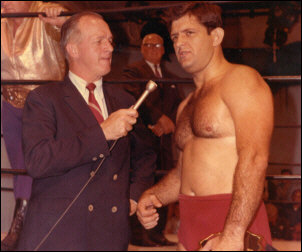FROM THE GATEWAY MAILBOX: A LETTER TO THE GATEWAY FOLLOWING THE POSTING OF OUR WGHP STUDIO TELEVISION FEATURE
I spent many days at the TV tapings at High Point, and I got to know a lot of the guys, at least as well as a little kid that was star struck could. Two of my earliest memories are from those tapings.
 |
| Charlie Harville and Johnny Weaver at Channel 8 |
I never had a dad around, and even as a very young man I was already showing signs of going down a bad road. I was fighting and telling lies. My mom saw where this kind of thing could lead. Well one day after we went to the tapings at WGHP, she went to Johnny and talked to him for a few minutes, then she called me over. I was in awe. The studio was empty other than us. Johnny was sitting on the ring near were the seats were and I was standing there next to him looking up at my hero. My mom had let him in on my acting up, and he asked me what was going on. I really don’t remember what I said, more than likely not a lot, people that have known me for a long time would be shocked that I was ever at a loss for words, but I was then. I do remember that he asked what I wanted to do with my life, and I said with out a moments thought that I wanted to be a wrestler. He smiled and said if I acted right at home and did not give my mom problems, and did good in school, that he would one day teach me how to wrestle.
Well I thought of that many times in my life after that. I ended up only being 5'8", so I never did call him on it! But I have no doubt that it changed my life. I did stop telling lies, and tried to be a good person, and I to this day try my best to live a life where I help people. In just a few minutes he became my role model, and I will never forget that.
Then one day when we went to the taping, there where no seats left. I remember being upset that we would not be able to see the show, but then the coolest thing that could have happened to a kid happened. We ended up sitting with the wrestlers.
There was a small room that led into the studio. After the people were in there seats the guys would come in and sit there waiting for their matches. The guys were talking, and sitting around. I was looking at the monitor seeing the show, and then someone sat next to me. I looked over and it was Bob Bruggers. He said hello and talked to me for a bit. I asked him about himself, and then he told me that he had played football for the Dolphins. WOW! That just blew me away.
Growing up in High Point we had no teams around, and the team that I loved was the Dolphins. This was near the end of the tapings there, around 1974 I think. After a few minutes he went out and did his match. I can not even tell you how cool it was to sit there and watch him walk away and then he was on the screen in front of me. I was yelling for him to do well. I remember the guys getting a laugh watching me get so into it.
Well you know what happened in 1975 not long after that. When the plane crash happened, I was in shock. When I heard he was in that plane, I felt that my friend was gone. What a damn shame that was, but I will always remember him for the kindness he showed a little kid one day in High Point.
I have so many good memories from that point in my life, going to the shows in Greensboro, and Winston Salem, and all over really. Thank you for starting this website. It is great to have these memories, and to know I am not the only one that really misses the days when the best show in the world was in my backyard.
- Michael Roach
February 2006


